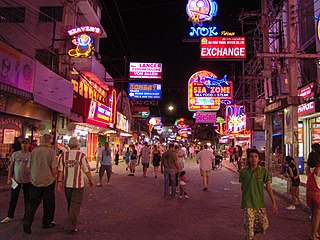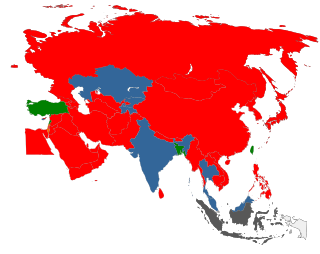Related Research Articles
Child sex tourism (CST) is tourism for the purpose of engaging in the prostitution of children, which is commercially facilitated child sexual abuse. The definition of child in the United Nations Convention on the Rights of the Child is "every human being below the age of 18 years". Child sex tourism results in both mental and physical consequences for the exploited children, which may include sexually transmitted infections, "drug addiction, pregnancy, malnutrition, social ostracism, and death", according to the State Department of the United States. Child sex tourism, part of the multibillion-dollar global sex tourism industry, is a form of child prostitution within the wider issue of commercial sexual exploitation of children. Child sex tourism victimizes approximately 2 million children around the world. The children who perform as prostitutes in the child sex tourism trade often have been lured or abducted into sexual slavery.

Prostitution in Thailand is not in itself illegal, but many of the activities associated with it are illegal. Because of police corruption and an economic reliance on prostitution dating back to the Vietnam War, it remains a significant presence in the country. It results from poverty, low levels of education and a lack of employment in rural areas. Prostitutes mostly come from the northeastern Isan region of Thailand, from ethnic minorities or from neighbouring countries, especially Myanmar and Laos. UNAIDS in 2019 estimated the total population of sex workers in Thailand to be 43,000.
The ages of consent vary by jurisdiction across Europe. The ages of consent are between 14 and 18. The vast majority of countries set their ages in the range of 14 to 16; only three countries, Cyprus (17), Ireland (17), Turkey (18), do not fit into this pattern. The laws can also stipulate which specific activities are permitted or specify the age at which one or other sex can legally participate. The highlighted age is that from which a young person can lawfully engage in a non-commercial sexual act with an older person, regardless of their age difference, provided the older one is not in a position of power, a relative, or is committing another form of exploitation. In some jurisdictions, including Italy and Hungary, there are exemptions if the age difference is within prescribed bounds. All jurisdictions in Europe, except the Vatican City, have equal and gender-neutral age limits.
Forced prostitution, also known as involuntary prostitution or compulsory prostitution, is prostitution or sexual slavery that takes place as a result of coercion by a third party. The terms "forced prostitution" or "enforced prostitution" appear in international and humanitarian conventions, such as the Rome Statute of the International Criminal Court, but have been inconsistently applied. "Forced prostitution" refers to conditions of control over a person who is coerced by another to engage in sexual activity.
Prostitution in Singapore in itself is not illegal, but various prostitution-related activities are criminalized. This includes public solicitation, living on the earnings of a prostitute and maintaining a brothel. In practice, police unofficially tolerate and monitor a limited number of brothels. Prostitutes in such establishments are required to undergo periodic health checks and must carry a health card.
Prostitution in Georgia is illegal but widespread, particularly in the capital, Tbilisi. Many NGO's attribute this to the harsh economic conditions according to the US State Department. Prostitution occurs on the streets, in bars, nightclubs, hotels and brothels. UNAIDS estimate there are 6,525 prostitutes in Georgia.

Prostitution in Pakistan is a taboo culture of sex-trade that exists as an open secret but illegal. Prostitution is largely based in organisational setups like brothels or furthered by individual call girls.

Prostitution in Bangladesh is legal and regulated. Prostitutes must register and state an affidavit stating that they are entering prostitution of their own free choice and that they are unable to find any other work. Bangladeshi prostitutes often suffer poor social conditions and are frequently socially degraded.
Prostitution in Egypt is illegal. The Egyptian National Police officially combats prostitution but, like almost all other countries, prostitution exists in Egypt. UNAIDS estimate there to be 23,000 prostitutes in the country, including Egyptians, West African and Eastern Europeans.
Prostitution in Brunei is illegal and can incur a punishment of imprisonment for 1 year and a fine of BN$ 5,000 for a first offence, or 3 years and BN$ 10,000 on a second or subsequent conviction.
Prostitution in Qatar is illegal and carries severe punishment of several years in prison. Prostitution normally takes place in bars, nightclubs and hotels. There are occasional clamp-downs and the prostitutes are arrested and deported. Many Chinese women travel to Qatar with tourist visas to work in prostitution.
Prostitution in Azerbaijan is illegal but common. Prostitution is an administrative offence and punishable by a fine. Keeping a brothel is a criminal offence and punishable by up to 6 years' imprisonment. In 2017 a draft law proposing to add heavy fines to the punishment for keeping a brothel was before the National Assembly. It has been estimated that there are 25,054 prostitutes in Azerbaijan, some of which are aged 15 to 18.
Prostitution in Bulgaria is itself legal, but organised prostitution is prohibited. In the past, the Bulgarian government considered fully legalising and regulating prostitution.
Prostitution in Rwanda is illegal in all aspects. Prostitutes, clients and any involved third parties are criminalised by the country's Penal Code. However, a draft of a new Penal Code that does not prohibit prostitution was presented for debate in the Rwandan Parliament in December 2017.

Prostitution law varies widely from country to country, and between jurisdictions within a country. At one extreme, prostitution or sex work is legal in some places and regarded as a profession, while at the other extreme, it is a crime punishable by death in some other places.
Turkmenistan is a source country for women subjected to human trafficking, specifically forced prostitution and for men in forced labor. Women from Turkmenistan are subjected to forced prostitution in Turkey. Men and women from Turkmenistan are subjected to conditions of forced labor in Turkey, including domestic servitude and also in textile sweatshops.
Prostitution in Bahrain is illegal but it has gained a reputation in the Middle East as major destination for sex tourism.
Prostitution in Bhutan is illegal but in many of Bhutan's border towns there are people openly practising in the sex trade. Prostitution mainly occurs in bars, clubs & hotels. Some of the sex workers are employed by bar and hotel owners to attract customers. Prostitution also occurs in the capital, Thimphu.
Prostitution in Tajikistan is legal, but related activities such as soliciting, procuring and brothel keeping are prohibited. Prostitution has increased within the country since the collapse of the Soviet Union. UNAIDS estimate there are 14,100 female sex workers in Tajikistan. Government official figures for 2015 were 1,777 prostitutes and 194 brothels. Prostitution occurs on the streets and in bars, restaurants, nightclubs and saunas, and HIV prevalence is 3.5% amongst sex workers.
Prostitution in Cape Verde is legal and commonplace. There are no prostitution laws on the islands except for those concerning trafficking and child prostitution. UNAIDS estimate there are 1,400 prostitutes in Cape Verde, and many were from Ghana and Senegal before being expelled by the police. Some turn to prostitution through poverty.
References
- ↑ "The Legal Status of Prostitution by Country". ChartsBin. Retrieved 30 January 2018.
- 1 2 3 4 5 "Review of Turkmenistan under the Convention on the Elimination of All Forms of Discrimination against Women" (PDF). OHCHR. September 2012. Retrieved 30 January 2018.
- 1 2 3 4 "TURKMENISTAN: Prostitution on the rise". IRIN . Retrieved 2011-09-18.
- 1 2 "Turkmenistan: Poverty Drives Addiction and Prostitution". Institute for War and Peace Reporting. 21 February 2005. Retrieved 30 January 2018.
- 1 2 "Turkmenistan 2011 Crime and Safety Report". OSAC . Archived from the original (PDF) on March 25, 2012. Retrieved 2011-09-18.
- ↑ "Heroin Seizes Turkmenistan, a Nation Ill Equipped to Cope". The New York Times . Retrieved 2011-09-18.
- ↑ "Cultural Learnings of America for Make Benefit Glorious Nation of Kazakhstan". IMDB. Retrieved 1 April 2022.
- ↑ "Turkmen women in discos 'risk arrest'". BBC News. 28 November 2013. Retrieved 30 January 2018.
- 1 2 3 4 "Turkmenistan 2017 Trafficking in Persons Report". U.S. Department of State. Archived from the original on 3 July 2017. Retrieved 30 January 2018.
 This article incorporates text from this source, which is in the public domain .
This article incorporates text from this source, which is in the public domain . - ↑ "Report submitted by Turkmenistan". OHCHR . Retrieved 30 January 2018.
- 1 2 3 4 Ovezova, Kumush (28 November 2008). "It is better not to be born beautiful". Chronicles of Turkmenistan. Archived from the original on 31 January 2018. Retrieved 30 January 2018.